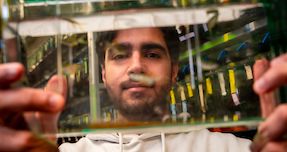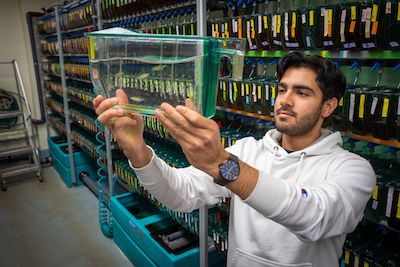Researcher of the Month
January 2024
Rehman Basharat
Major: Biology (Interdisciplinary Biology), Class of 2024
Research Mentor: Dr. Howard Sirotkin, Neurobiology & Behavior
Rehman Basharat is an aspiring physician, on track to graduate this month with a Bachelor of Science
in Biology (Interdisciplinary Biology track). For over two years, Rehman has been
doing research in the laboratory of Dr. Howard Sirotkin (Department of Neurobiology
& Behavior) where he learned zebrafish husbandry, collecting zebrafish embryos, purification
techniques, genotyping, behavioral assays, and microinjecting. His main project in
the Sirotkin group  involves optimizing a novel genome editing technique (prime editing) to develop zebrafish
ASD models that can be used to understand neurodevelopmental defects and to screen
potential therapeutic compounds. Rehman was awarded URECA funding in both Summers
2022 and 2023; and presented a poster on “Modeling ASD-Associated NMDAR Missense Mutations in Zebrafish” at the 2023 URECA Celebration. Rehman will be presenting his work on "Optimization of Prime Editing to Develop Disease Associated Variant Models" later this month at the National Collegiate Research Conference (NCRC) at Harvard University, with support from a URECA mini-grant award. Rehman has also done some work on K-RAS and its role in pancreatic cancer in the Reich
lab.
involves optimizing a novel genome editing technique (prime editing) to develop zebrafish
ASD models that can be used to understand neurodevelopmental defects and to screen
potential therapeutic compounds. Rehman was awarded URECA funding in both Summers
2022 and 2023; and presented a poster on “Modeling ASD-Associated NMDAR Missense Mutations in Zebrafish” at the 2023 URECA Celebration. Rehman will be presenting his work on "Optimization of Prime Editing to Develop Disease Associated Variant Models" later this month at the National Collegiate Research Conference (NCRC) at Harvard University, with support from a URECA mini-grant award. Rehman has also done some work on K-RAS and its role in pancreatic cancer in the Reich
lab.
On campus, Rehman has been active as a Teaching Assistant for Biochemistry I, Statistics and Probability, and Molecular Science I; and served as a tutor for the Academic Success and Tutoring Center (ASTC). He currently is Executive VP for the campus chapter of the National Society of Collegiate Scholars. Rehman also volunteers at the Stony Brook Cancer Center; participated in the Stony Brook Clinical Experience Program; and has completed bystander training/certifications at the Center for Prevention and Outreach (Green Dot, QPR, Red Watch Band).
As Rehman reflects on his learning trajectory in the Sirotkin research group, where he developed his skills and became more independent as a researcher, he credits the immersive summer URECA experiences for really understanding the big-picture implications of the research: “Initially, the dots weren't connecting. I was just doing stuff but I didn't understand why I was doing it. And because I had classes and other commitments, I wasn't able to be there 40 hours a week like I was when I was in the URECA summer program. … but being in URECA full time, 8 hours a day, 5 days a week, I was able to develop the full picture from point A to Point B, and what happens in between, and also to be able to understand what I'm doing and why I'm doing it. “
Rehman is a graduate of Leon M. Goldstein high school and enjoys playing soccer. Below are excerpts of his interview with Karen Kernan, URECA Director.
The Interview:
Karen: How did you get initially started in doing research?
Rehman: I've been in the Sirotkin lab since October 2021, my sophomore year. The reason I initially was interested in the Sirotkin lab was because I had a close relative who had some developmental issues and I knew that Dr. Sirotkin did research on neurodevelopmental issues, such as Parkinson's and ASD. So I contacted him, and he gave me the opportunity to work in his lab.
What is your research all about?
The whole purpose of my research is to create mutations associated with autism. There are certain mutations that have already been linked to ASD in a clinical setting and our goal is to test these mutations in zebrafish as our model organisms. We use a specific mechanism that's similar to CRISPR Cas9 called prime editing-- and it allows us to make precise one nucleotide mutations that we can then test. Currently, I have one mutation. But I'm in the process of hopefully making many, many more and optimizing the technique.
What do you like most about being in your lab and doing research?
I like the autonomy it gives me. Now, I can basically go in any day and I know what I'm doing. I can plan experiments myself, from start to finish. Obviously, I still regularly discuss with my mentor what I’m working on, and get his opinion and guidance. But the autonomy of the research is an aspect that I really enjoy. I don't need to be micromanaged, which is usually how you start off. And doing the experiment and getting good data back is always a bonus on top of that. It makes you want to pursue it even more.
Did you have a lot of experience when you first joined?
When I started, everything was new to me. There was a learning curve of adapting to new techniques and learning how to do procedures correctly--learning the mechanisms of what you're doing and understanding it. But after being in the lab for a while, I feel I now have a full grasp of what I do and why I do it, and can be autonomous on future plans and experiments.
How has being involved in research enhanced your education?
In classes, we learn certain principles. We learn PCR and on paper it seems simple. But when you apply the techniques in lab, it’s very different and there are so many things that can go wrong. The skills you learn from being able to troubleshoot what went wrong and how to fix it help you develop knowledge that you wouldn’t learn in a classroom setting, or from a textbook.
How has your mentor guided you in your research?
Just by talking with him, I learn so much. Just the other day, we were going back and forth on what we could do to make the prime editing work better. And by these conversations that we have, I develop critical thinking skills and gain a fuller perspective of everything I'm doing.
What advice would you give them to other students about undergraduate research?
My biggest advice is to pursue something that you care about. If you have a family member who has cancer, you might be more motivated to pursue cancer research, because it’s something that's relevant to you. Do something that you like. Pursue something you are interested in, because you’ll put more time in the lab and be more engaged overall if you’re doing something you like or care about.
What are the advantages of doing this summer research?
I think it helps you understand everything you're doing on a much, much deeper scale. Initially, when I started in the lab, I was under the guidance of a PhD. student, so I would just be told what to do: “Hey, today, do this, and this, and this; or do that …” And you know, initially, the dots weren't connecting. I was just doing stuff but I didn't understand why I was doing it. And because I had classes and other commitments, I wasn't able to be there 40 hours a week like I was when I was in the URECA summer program. So if I would do something in the lab, the next part of it would be done by someone else, or the PhD student. So I always had that gap in between, where I would not get the full picture of what to do from Point A to Point B… but being in URECA full time, 8 hours a day, 5 days a week, I was able to develop the full picture from point A to Point B, and what happens in between, and also to be able to understand what I'm doing and why I'm doing it.
Did you know you wanted to be involved with research when you first came to Stony Brook?
Actually, early on, I was a bit conflicted on if I wanted to do something or not with research. But then I just decided to give it a shot and see if I liked or not, and since then, I found that I really enjoy it, and I've been at it since then. I have a good time in lab. Prof. Sirotkin is a great mentor and I like working with him, and with zebrafish!

